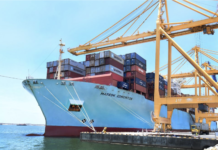
Taiwan-headquartered freight forwarder Dimerco, which knows a thing or two about building companies and reputations, with over 50 years of experience in the forwarding business, believes this market is the most challenging it’s ever been.
Alvin Fuh, VP of Dimerco’s ocean freight told Container News that beneficial cargo owners (BCOs) these days have to deal with a much more challenging and complex environment in their global supply chain networks, with black swan events, geopolitical disruptions and the growing protectionism, which is seeing manufacturing shifting from a centralised China operation to a decentralised multi-nodal process.
“China plus one, is a business strategy that emerged to avoid investing only in China and diversify businesses into other countries, or to channel investments into manufacturing in other promising developing countries such as India, Vietnam, Thailand and Mexico,” said Fuh.
According to the Dimerco executive, the next US election will see an increase in protectionism, whichever party wins, with Trump expected to ramp up his economic war with China, if he is elected.
In an interview with Bloomberg last week, Trump “signalled” the possibility of 50% tariffs on Chinese imports (which is lower than the 60% tariffs he was considering earlier this year).
“Tariffs do two things. Economically, they’re phenomenal … and man, is it good for negotiation,” Trump told Bloomberg.
Fuh, however, disagrees with the Republican nominee, saying tariffs stifle trade and ultimately results in lower income, reduced employment, and lower economic output.
“US intensifying trade barriers against China will reduce economic output and income. Historical evidence shows that tariffs raise prices, reduce available quantities of goods and services for consumers to choose from,” claimed Fuh.
A report published by the Washington thinktank the Tax Foundation in June of this year, shows the severe impact of protectionism on the working population.
“Economists generally agree free trade increases the level of economic output and income, while conversely, trade barriers reduce economic output and income. Historical evidence shows that tariffs raise prices, reduce available quantities of goods and services for the consumers to choose, which results in lower income, reduced employment, and lower economic output,” noted Fuh.
“Carriers, meanwhile, have reacted to the shift of manufacturing from China to India, SE Asia, Middle East and Latin America. In a very recent issue published by Alphaliner, we could easily tell that the ocean carriers definitely know how to best put their money where their mouths are by realigning their service deployments with the global trade shifts.”
Fuh’s experience tells him that carriers will continue to take measures that will maintain rates at as high a level as is feasible in the prevailing market conditions.
“My past experiences working in shipping tells us that the carriers will never stop their endeavours to keep the rates high, for as long as possible,” claimed Fuh.
“Ocean carriers basically would take such measures as imposing a series of GRIs, PSSs, Bunker Adjustments and capacity management measures such as slow steaming, blank sailings,” to maintain rate levels.
Mary Ann Evans
Correspodent at Large








